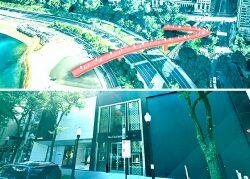A Gold Coast luxury retail lease that Fred Latsko thought was in the bag spilled out in Cook County court, jeopardizing the deal.
An affiliate of Latsko’s company, retail landlord Latsko Interests, sued Parisian handbag maker Maison Goyard, alleging the would-be tenant dragged its feet on designing and tweaking its interior buildout for a lease of about 4,400 square feet at 41 East Oak Street.
The dispute could break a 10-year lease with the retailer, which is notorious for avoiding advertising and media attention. It has fewer than a dozen locations globally, including eight in the US: New York, Chicago, Beverly Hills, Miami, Dallas and San Francisco.
Its Chicago space was within the Magnificent Mile’s Neiman Marcus location at 737 North Michigan Avenue, which was purchased last year for $94 million by Houston-based Silvestri Investments. Goyard had planned to leave the luxury retailer’s store for its own space on Oak Street.
“Despite Goyard and our team working on what is clearly the best Oak Street location for their brand, we have had to file the suit against Goyard due to their failure to meet their lease obligations,” Latsko said. “We have made every effort to resolve the issue amicably, but sadly we were left with no other choice but to seek legal action to get things sorted.”
Latsko’s complaint, filed earlier this month, claims Goyard breached the lease agreement by failing to give final approval to the interior design that the landlord would carry out, delaying for more than a year. It says a lawyer for Goyard in September told Latsko that their failure to complete the buildout by the extended completion date of September 26 meant the landlord was in breach of the lease.
Latsko, however, claimed Goyard violated the contract because it hadn’t “complied with the initial layout and continues to make constant changes preventing landlord to complete their plans to begin their work,” the complaint said.
Goyard was set to lease two floors in the building for $8.4 million in base rent over the life of the lease, or about $194 per square foot annually, according to exhibits filed in the lawsuit. Average retail rental rates in the luxury shopping district on Oak and Rush streets reach about $350, after factoring in triple-net lease costs usually paid by tenants, including taxes, utilities, insurance and maintenance, according to a fall Cushman & Wakefield report.
Goyard and an attorney for the company did not return requests for comment. It’s unclear whether the lawsuit will kill the deal, or whether the retailer plans to continue operating its space within the Neiman Marcus building. Neither Neiman Marcus nor its new landlord Silvestri returned requests for comment.
An LLC tied to Latsko bought the Oak Street property for $10 million in 2007, records show. Latsko Interests is asking the court to accelerate Goyard’s payment of its base rent for the rest of the lease term, meaning it would owe nearly the entire $8.4 million to the landlord if a judge rules in the property owner’s favor. The landlord is also asking the court to rule that Goyard didn’t have grounds to terminate the lease.
Elsewhere on Oak Street, Chicago-based landlord L3 Capital is working on continuing the luxury corridor’s momentum, which was mostly unaffected by the pandemic, a contrast to the Mag Mile’s tough recovery. L3 has a deal to lease two stories in the 10,000-square-foot building at 120 East Oak Street to Chicago-based jeweler Burdeen’s Jewelry.
With its boutique focus on luxury, Oak has become a model that urban planning experts have suggested to bring around the corner to the struggling northern end of the Mag Mile, by creating smaller spaces that brands even outside the luxury segment could occupy. That would lower their costs compared to leasing the large-scale brick and mortar spots that take up much of Chicago’s most famous shopping strip, and could make room for mom and pop shops.
Read more



